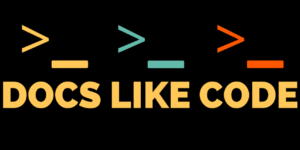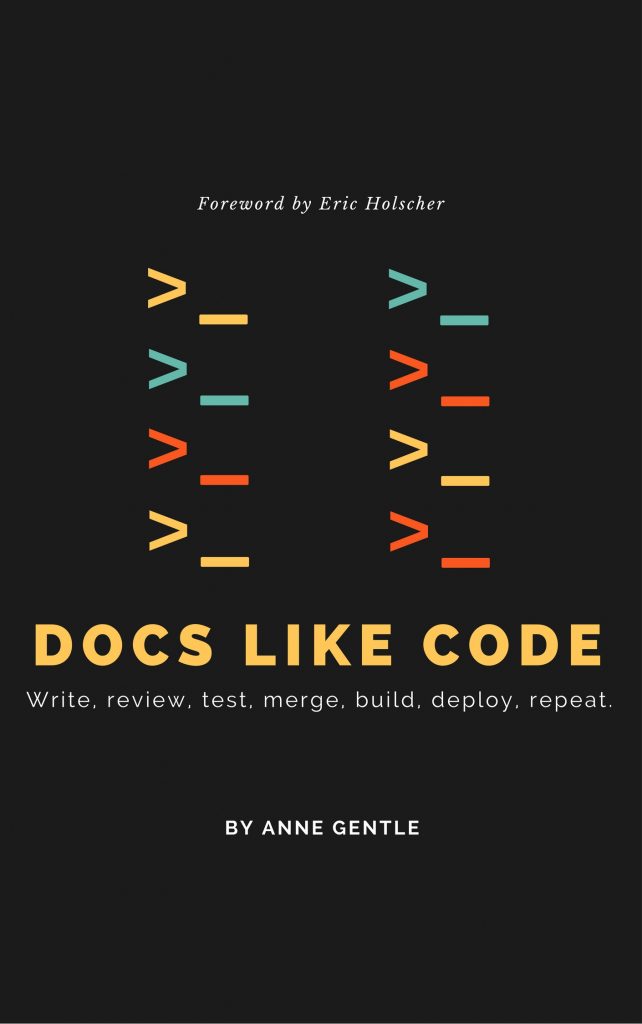
What does it take to put together a website, a book, an ebook, all for sale online? Let’s look at costs for tools and services that make it happen.
Let’s look at what you need for a book idea. You need an audience, an editor, a way to reach that audience, and a “pitch” for the book idea itself. You may choose self-publishing over pitching the book idea to a technical book publisher.

In my recent experience with Docs Like Code, the process led me to choose to produce the site, epub, and printed book all using tools I had prior experiences with. Let’s take a look.
Reaching out to current contacts
First, I reached out to Andy Oram, a senior editor at O’Reilly who knows me from a couple of open source projects, asking if he thought O’Reilly would want a book proposal. He said he’d be happy to read what I had but didn’t see the initial concept fitting into their current catalog. Really great of him to offer to help out, and I simply thanked him and kept going with my idea.
In parallel, I reached out to the publisher for my first book, Conversation and Community. His name is Richard Hamilton and he runs XML Press. When he looked at his schedule, he couldn’t read through at the draft copy for about 3 months. Well, I thought that the timing was essential, and I didn’t want to wait that long, knowing both the market and my own availability.
Finding like-minded collaborators
I also reached out to Diane Fleming, now Skwish, who had been teaching writers how to use Git and GitHub for docs over the same time as I had been. Over lunch, we realized we both wanted this book to be available for the next time we teach developers and writers how to write and review docs on GitHub. Diane is a talented writer and also a super editor. The best writers re-write a lot, and I knew Diane would provide an eagle eye for both technical accuracies as well as great writing.
Then, I realized I have a great friend in Kelly Holcomb, who edited my first book and I could talk her into editing this one, wahoo! Kelly also had experience in using GitHub for editing, so her contributions were super important for the final copy.
One area I did skip for this book was a professional-level index, which Kelly was able to do a great job on for Conversation and Community. I haven’t missed the index yet, and for a smaller book, it seems like an index could look like padding.
Design materials and promotional work
I also was able to do all the design imagery myself, including the book cover. This part was thanks to Canva and some nice templates that the service has online. I used the free trial for Canva to make the book cover and stickers and t-shirt design.
That said, I was not willing to take on the layout work myself. So, when Gitbook did not output a PDF that I considered “print-ready”, I went to Upwork. Upwork let me hire a professional layout designer who could create a fine-tuned layout and design for the print copy, including proper page breaks and nice tables. I hired a designer with access to Indesign who could take the epub file and turn it into a print book.
Pull it together!
And so, with all those bits of input from others, it created a quest to be a product manager for my own information product! I went that route, and for me, Lulu was a tool I was already familiar with because we had done publishing with it for OpenStack.
There are other publishing options – IngramSpark, Amazon, LeanPub, and I’m sure others. I did sign up and get approved for an account with IngramSpark, which is the print-on-demand service that XML Press uses.
To me, after reading the origin story for Lulu, I feel that Lulu is a bit more “open source” based than say, Amazon. I don’t know much about LeanPub. Since I was using Markdown on a private GitHub repo anyway, it doesn’t seem to offer more than Lulu for the marketplace reach. I’m not trying to make money at it; only trying to increase reach.
Finding a freelance editor would be a huge leg up on the writing process itself, especially if you also need a bit of developmental editing for the book idea.
For the print layout, I had a great experience with UpWork and was also able to keep the same person for the work I needed for the second edition. I learned from using a freelance site that I can find and manage freelancers for projects that I want to get done but don’t want to carve out time or buy tools for myself to finish.
List of tools and services
| Tools | Site |
|---|---|
| Calibre | https://www.calibre-ebook.com/ |
| Canva | https://www.canva.com/ |
| GitBook | https://www.gitbook.com/ |
| GitHub | https://www.github.com/ |
| Lulu | https://www.lulu.com/ |
| Mailchimp | https://www.mailchimp.com/ |
| Printful | https://www.printful.com/ |
| Shopify | https://www.shopify.com/ |
| Upwork | https://www.upwork.com/ |
Ongoing and startup costs
Here’s a high-level overview of the startup costs for creating a book like Docs Like Code. I calculated the starting costs for six or five months when I needed a monthly subscription for a service.
Based on Lulu reporting, I see the book brought in about $2500 in 12 months of the first and second editions being available. So while the startup costs are something, I did see a profit from the effort. Really, though, the effort is paid off in helping others see the benefits I’ve observed and in sharing and learning. Let me know what you think about this method, the tools, and of course, the resulting book, Docs Like Code, which you can buy online.
| Service | Costs |
|---|---|
| Domain name registration | $20/year |
| GitHub for Private repo (ongoing) | $42 ($7/month x 6) |
| GitBooks for Private repo | $35 ($7/month x 5) |
| GitHub Pages for the website | $0 |
| Canva for Work (cover art) | $0 trial |
| Lulu (printed copies) | $82 for 15 printed |
| Editing/Writing | $250 celebration |
| Design for PDF layout | $250 |
| MailChimp (ongoing) | $42 ($7/month x 6) |
| Twitter ads | $25 for ads |
| Stickers | $82 for 200 |
| Total startup costs | $828 |
First published on Docs Like Code at https://www.docslikecode.com/articles/practical-advice/ in April 2018.

An update for June 2022
Ongoing costs continue, though the costs have not increased. I have switched from GitHub Pages to Netlify for the website for the book, but that service continues to be free. GitHub monthly costs have gone down to $4/month. I have paid for Canva over time as it turns out to be a very useful service for many other purposes. I stopped selling t-shirts a few years ago, and no longer print stickers. So those are both rare if you still have them! I no longer pay for GitBooks service since I can build it locally and don’t need hosting or collaboration features from that service.
| Service | Costs |
|---|---|
| Domain name registration | $20/month |
| Netlify | $0 |
| GitHub for private repo | $4/month |
| MailChimp | $28/month |
| Total ongoing costs per month | $52/month |